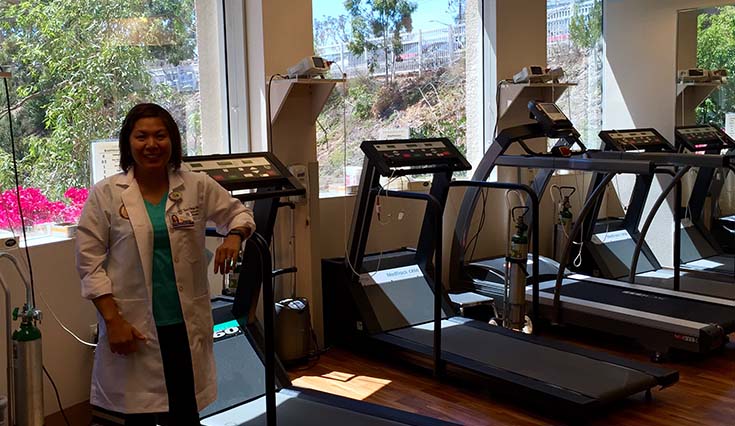
By Russel Sison-Tojino, RRT-NPS, AE-C
They say everything happens for a reason and at the right time, and I believe that’s exactly what happened to me. I began a new career in respiratory therapy in the pulmonary rehabilitation specialty at a perfect time in my life personally and professionally. Now I cannot think of doing anything else!
The Pulmonary Rehabilitation Specialty Leap Of Faith
After 12 years working as an acute care respiratory therapist, I felt exhausted and in need of a change. I took a leap of faith leaving my hospital position, and fortunately another door opened for me in pulmonary rehabilitation. It was an unknown field for me but I am glad I took the chance of trying something new.
It was an exciting as well as a daunting transition. I thought that working in pulmonary rehabilitation (PR), wouldn’t be so different from being a hospital RT. I had worked in trauma, the ICU, NICU, and ER, and in general care areas in the hospital, but PR requires a very different skill set.
I didn’t learn about PR in respiratory school nor did I have a rotation in a PR clinic. I had not even heard much about it while working in several hospitals. My years in the respiratory field provided a good working knowledge of many different lung diseases. I was also able to utilize my assessment skills in recognizing clinical changes, communicating those changes, and making recommendations to physicians. Though these skills were helpful, most of my PR training I received on the job.
Dealing With Fear And Frustration
Pulmonary rehabilitation involves educating those with chronic lung disease, helping to improve physical function, and coordinating the best plan of care. Educating patients at this level was new to me. I had basic knowledge of inhalers and oxygen; however, topics such as exercise, travel, establishing an advance care directive, and giving guidance with nutritional needs were unfamiliar to me.
Performing a comprehensive initial evaluation is critical in assessing the needs of a patient prior to enrolling in the PR program and guides the course of therapy. Although our traditional program is in a group setting, our prescription for exercise and progress is individualized based on this initial evaluation.
Every patient has a different set of limitations to exercise, including dyspnea, muscle fatigue, and sometimes orthopedic pain. The one thing they have most in common is the fear and frustration of having lung disease. Part of my job is to provide support for patients coping with this fear and frustration, at times recommending further professional psychological evaluation. The depth of teaching and responsibility in PR differs vastly from the role of the inpatient therapist.
Poster Child For PR
In my six years thus far in PR, I have encountered multiple amazing people. One that stands out in my mind is a patient I had in the beginning of my PR career. He was in his early 60s, a well-educated business owner with GOLD stage III COPD.
He did not say so in so many words, but he had fears, sadness, and frustration related to the changes caused by his lung disease, which had greatly affected his quality of life. He ended up being the class motivator and a great support for his rehab group. By the end of his program, he was labeled by his pulmonologist as the “poster child for pulmonary rehab” and his family and friends were ecstatic with his vast improvement.
He had gained the confidence in knowing that, yes, he has COPD, but he can still live a happy and fulfilling life. He told me how life-changing our clinical team and PR program were to him. To this day, this patient regularly sends flowers, calls, and emails to tell me of his latest adventures and how grateful he is for the team at UCSD PR.
Perfect Fit
All respiratory schools should add PR to their didactic and clinical instruction. That said, I think it’s very valuable to gain clinical experience working in an inpatient setting before looking into PR, if it is of interest to you.
I am privileged and grateful to be a part of caring for people with chronic lung disease. It is awe-inspiring to see the unveiling of a person with newly learned knowledge and newly gained confidence in so little time. My job makes a difference to a person struggling with something they don’t fully understand. I help them overcome their fear of the unknown through education and exercise.
This why I know being a PR coordinator is the right fit for me!
Russel Sison-Tojino is the clinical coordinator for the UCSD pulmonary rehabilitation program in San Diego, CA.





